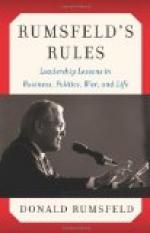My unpopular belief that nobody should meddle with the management of a war unless he understands it is, I admit, most uncomfortable, for as a war is always managed by the Government I am obliged to think that every Government ought to understand war. But in this country the Government is entrusted to a Committee of Peers and Members of Parliament, none of whom is supposed to be able to take a military view of war. If my belief is right, a British Cabinet is very liable to take a civilian view, and the consequences might be awkward. In fact they are awkward, as the South African war up to date abundantly reveals.
The military view of war is that it consists in the employment of force to compel an adversary to do your will. The employment of force is required in the management of a Nation’s affairs when the Nation has quite made up its mind to have something done which another Nation or State has made up its mind shall not be done. When there is this point-blank conflict of wills, and neither side can give way, there must be war; and the military view is that when you see war coming you should get your troops into their places, because the first moves are the most important, and a bad first move is very apt to lead to checkmate.
In the case of South Africa the true view was taken at the right time by Sir Alfred Milner. He was instructed that Great Britain would take up the Uitlander’s cause, and sent to Bloemfontein to see whether President Kruger was prepared for an equitable settlement. He proposed such a settlement, and, as President Kruger declared the terms impossible, he made it plain that if there were no settlement on such lines as he had suggested, there must be war. That was the true view, and the moment when the conference was broken off was the moment for Great Britain to get her forces ready with all convenient speed. But Mr. Balfour on the day when he heard the news took a civilian view; instead of looking the war in the face he expressed the hope that President Kruger would change his mind. That hope the Government cherished, as we now know, until the end of the first week of September, when the Boer forces were so far on in their preparations that Natal had been begging for protection. The Government then sent ten thousand men, making the sixteen thousand of Sir George White. Yet the Government at that time had before it the military view that to compel the Boers to accept Great Britain’s will seventy thousand men would be required. Evidently, then, the sending of the ten thousand arose not from the military view, but the civil view that war is a disagreeable business, and that it is to be hoped there will be none of it, or at any rate as little as possible.




